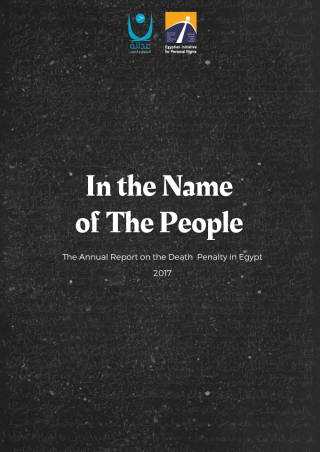April 2018 ended as one of the worst months for the issuance of death sentences. Most of these were issued in ordinary criminal cases, not political, and in one case, 45 defendants were sentenced to death, leading observers to wonder if criminal judges in Egypt have any sentencing tools at their disposal but the death penalty.
Programs: Criminal Justice
The EIPR again urges the court to sentence the defendants to the maximum penalty allowed for the crimes for which they are charged, the prosecution having declined to charge the defendants with torture under Article 126 of the Penal Code and instead opting for assault leading to death.
EIPR recommends that all places of detention regulated by the Egyptian Prison authorities guarantee sentenced prisoners’ bimonthly and pretrial detainees weekly right to 60 minute visits—without a glass barrier or any other additional constraints.
The EIPR urges the president to use the authority imparted to him by the law to substitute the death sentence with a less severe punishment until the petition to reopen the case is considered. The president has previously commuted a death sentence against Mohammed Hussein on 22 January 2017.
The Egyptian Initiative for Personal Rights criticized the parliament for approving a government-submitted bill by a two-thirds majority vote in its general session on Tuesday, March 6. The bill amends provisions of the Penal Code (Law 58/1937) to stiffen penalties on persons convicted of the possession, importation, or manufacture of explosives. According to media sources, the bill introduces the death penalty for one of the crimes set forth.
The Egyptian Initiative for Personal Rights condemns attempts to intimidate the family and those who have acted in solidarity with the family of 22-year-old Muqattam victim Mohammed Abd al-Hakim Mahmoud, known as Afrotto, in order to influence the
This series of reports aims to shed light on the provisions of the death penalty and act as a reference for preliminary information on this penalty in Egypt in light of the relative scarcity of such information, as part of the effort and campaign to abolish the death penalty in Egypt. The report will also monitor patterns of human rights violations in some capital punishment cases throughout the year, which in itself constitutes a violation of the right to life.
The report is divided into two chapters: the first includes factual information on some cases in which death sentences were handed out and upheld during 2017; the second identifies patterns of human rights violations which some of the defendants sentenced to the death in praesentia faced in the course of trial proceedings.
The undersigned rights groups condemn the execution of three defendants, before yesterday, in case no. 93/2011/Ismailiya plenary military felonies, following a trial before a military court that did not meet fair trial standards. With this, 22 civilians have now been put to death following military trials in just three weeks, a toll unprecedented in Egypt’s modern history.
At least 19 civilians were executed within the span of a week, pursuant to sentences given by military courts that do not meet the minimum requirements for fair trials; an increasing number of militant attacks on civilians and military personnel were also recorded during this time.




